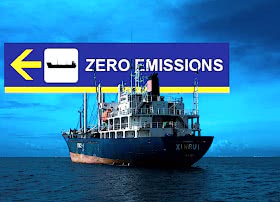
Know in what direction to go and what are the means to reach the goal. These are the two questions which the shipowning industry has long addressed to the international institutions in order to be able to effectively address its efforts to decarbonize the marine transport and to which it has for the same time called for clear answers. Those who the shipowning association International Chamber of Shipping (ICS) has again formulated in view of the next meetings centered on the reduction of gas to greenhouse effect produced from the shipping that will be held at the International Maritime Organization (IMO), starting from the fifteenth session of the Intersessional Working Group on the Reduction of GHG Emissions from Ships (ISWG-GHG) of the agency of the next United Nations that is in
 "One standard on fuels - the deputy secretary general of the ICS has explained, Simon Bennett - alone will not succeed. It must be supported by resolute economic measures, to be applied worldwide to encourage the production and use of low and zero greenhouse gas emissions to accelerate the transition towards the goal of zero emissions".
"One standard on fuels - the deputy secretary general of the ICS has explained, Simon Bennett - alone will not succeed. It must be supported by resolute economic measures, to be applied worldwide to encourage the production and use of low and zero greenhouse gas emissions to accelerate the transition towards the goal of zero emissions".
Bennett has remembered the commitment long manifested by the shipping industry for its decarbonization despite its content contribution to the global emissions: "the marine transport - it has evidenced the deputy secretary general of the ICS - remains the most efficient way in terms of carbon emissions to transport the goods we all use, since approximately 90% of the world trade is transported by sea. However - it has clarified Bennett - being efficient does not mean that we do not have to work to reduce the quota of 3% with which the marine transport contributes to the world carbon emissions. All - it has emphasized - we have a role to play in decarbonization".
Bennett has continued remembering that ICS, also in this already for a long time, has proposed the creation of a fund financed from the same shipowners to decarbonize the shipping: "the shipowners - it has reiterated - are willing to make deposits in a global multimillion-dollar fund that, if properly structured, will reduce the cost gap between conventional fuel oil and zero greenhouse gas fuels, which are much more expensive, as soon as they begin to become available. The "Fund and Reward" mechanism of the ICS - it has rimarcato Bennett - is an equitable measure that will also guarantee the developing countries to use part of the billions of dollars, that would be generated every year from the contributions of the shipowners, to create the infrastructure of the future, while at the same time encouraging the "first motives" to act. A growing number of governments recognize the merits of these proposals in the field, but - the deputy general secretary of the ICS specified in view of the forthcoming meetings of the IMO - we must ensure that those developing nations that are still concerned for the impact of the limited additional cost of marine fuel on their economies can recognize the opportunity generated by this fund at the IMO".
"To produce large amounts of low and zero greenhouse gas fuels, such as methanol, ammonia and hydrogen, sustainable biofuels and synthetic fuels, as well as for the development of new technologies such as carbon capture - Bennett concluded - effective global regulation and considerable incentives will be necessary, and not only the adoption of a new greenhouse gas reduction target. Establishing a travel direction is important, but without the tools to get there becomes a senseless aspiration".